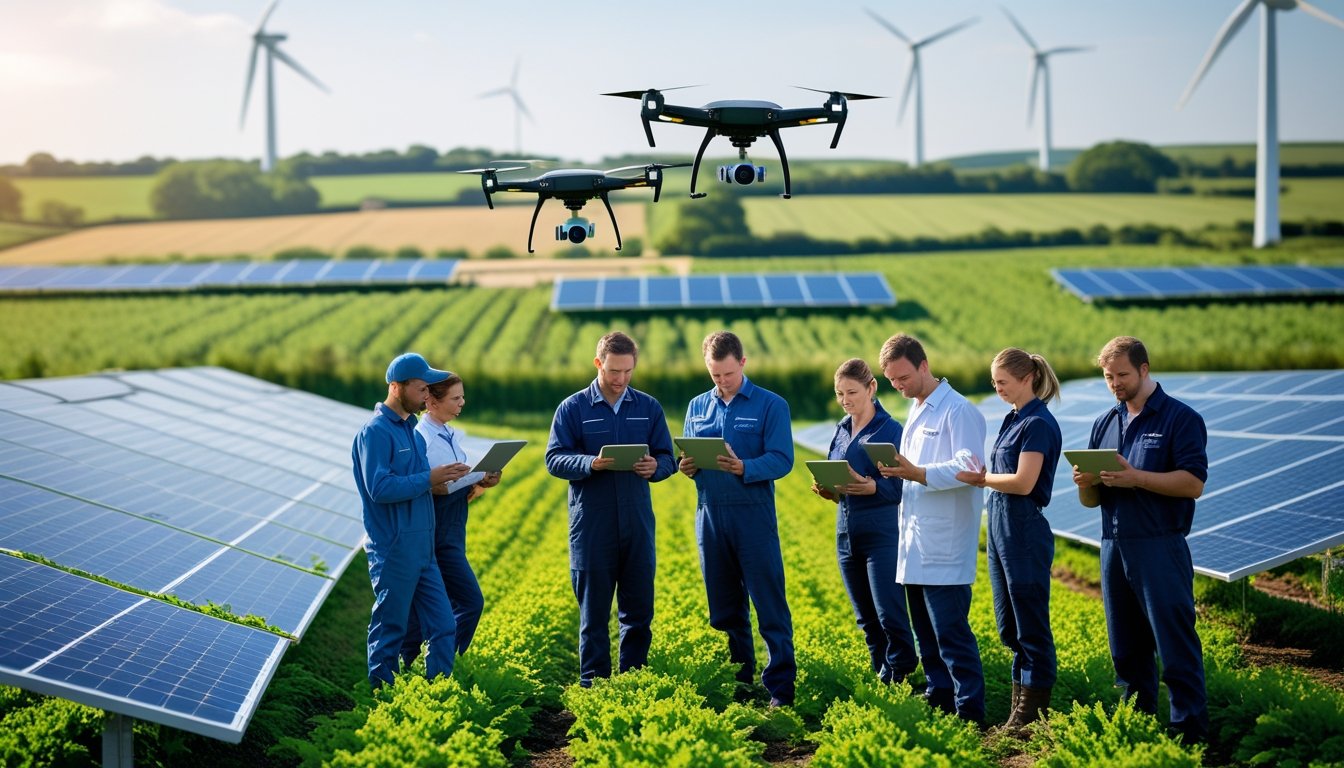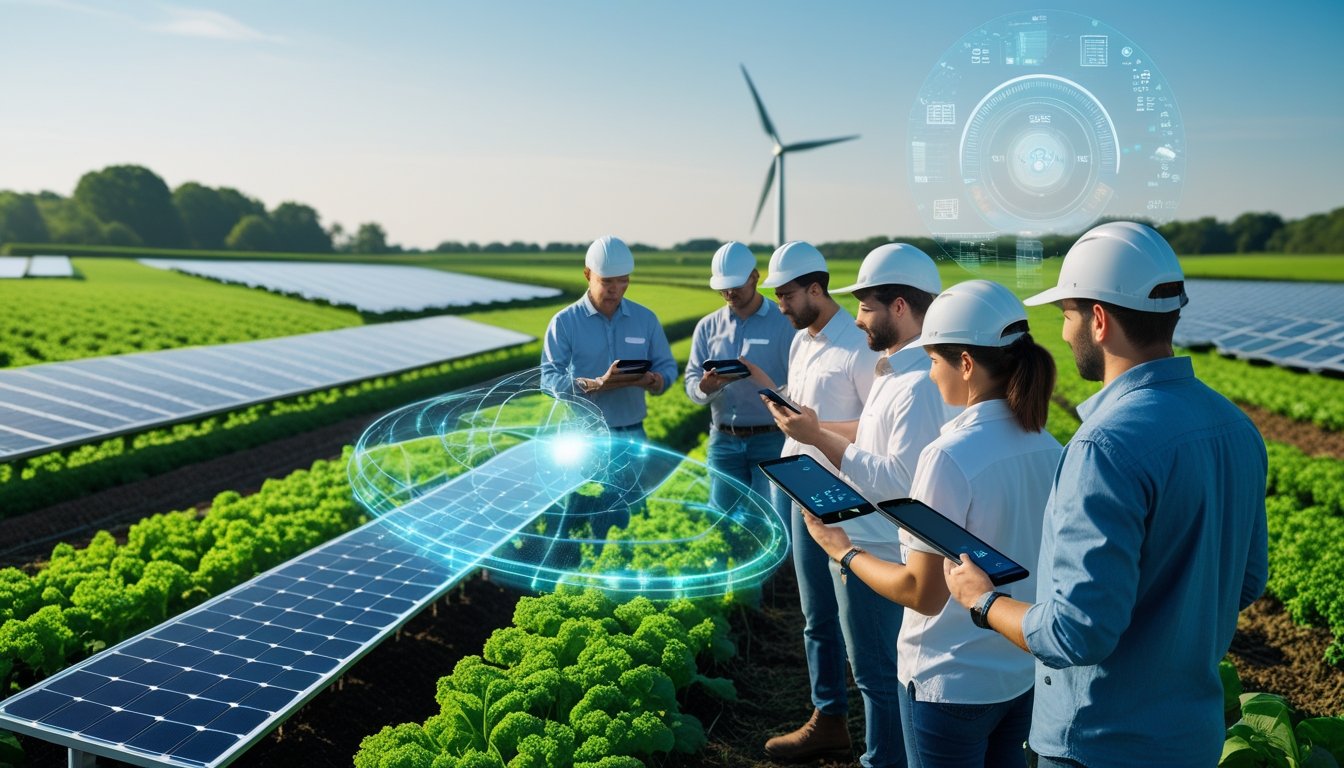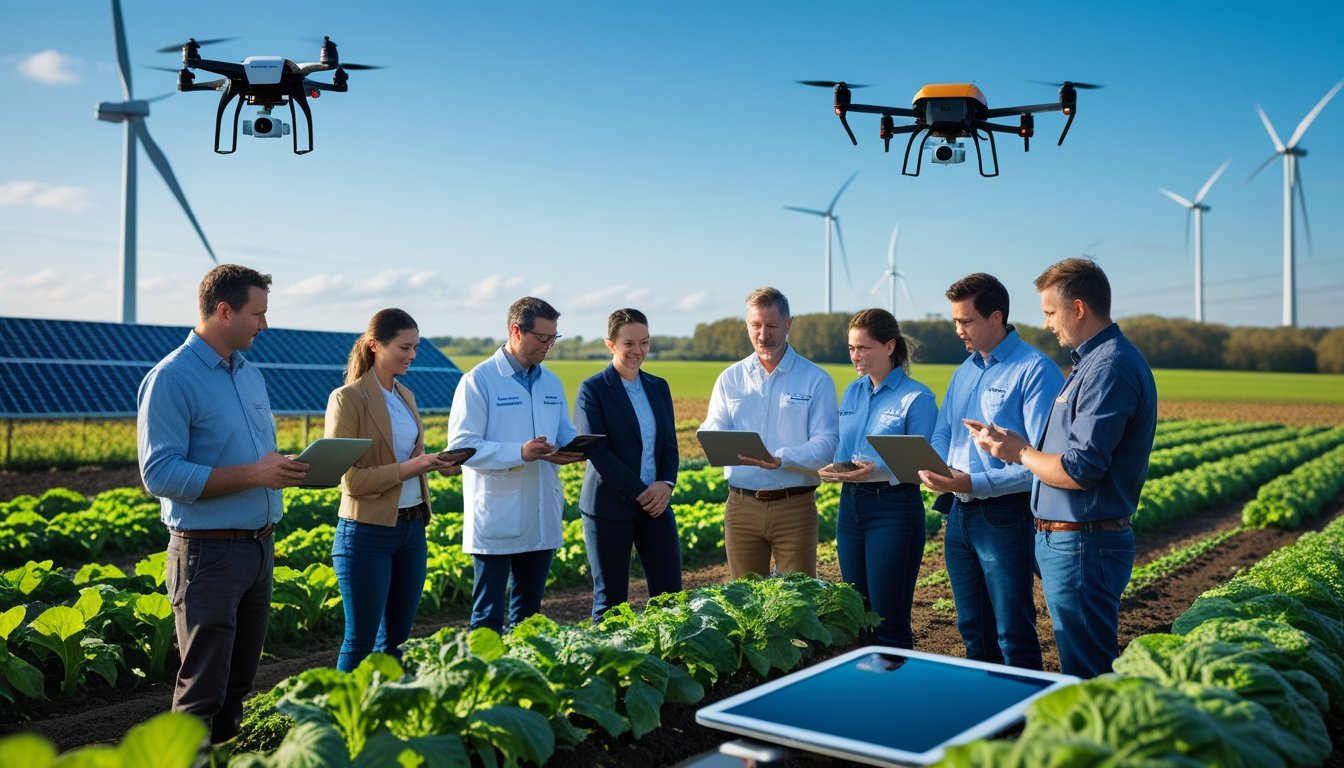Late updated: 23 Jul 2025 13:07
Written by: Oliver Bennett
AI Solutions Enhancing UK Renewable Farming Practices: Boosting Sustainability and Efficiency
Artificial intelligence is making waves in the UK agricultural sector by integrating cutting-edge technologies into sustainable farming practices. With its ability to optimise resource usage and innovate traditional methods, AI is crucial in transforming renewable farming operations. By adopting AI solutions, we are witnessing a revolutionary increase in productivity, cost savings, and energy efficiency in UK farms.

The synergy between AI and renewable farming is not just about reducing costs or increasing yields; it's about creating a resilient agricultural ecosystem. As we explore how machine learning and precision tools help minimise carbon footprints, we uncover new pathways to sustain our fields and foster environmental balance. These advancements stand at the forefront of our pursuit of greener farming solutions.
This new dawn of AI-driven agriculture holds promise for long-term environmental benefits and a sustainable future. Join us on this journey to discover the potential of artificial intelligence in reshaping the agricultural landscape and its implications for our ecosystem.
Key Takeaways
- AI innovates UK farming with increased efficiency.
- Machine learning enhances sustainable agricultural practices.
- AI in farming leads to cost savings and eco-friendly solutions.
AI-Driven Solutions Transforming Renewable Farming in the UK
AI is revolutionising UK renewable farming with precision tools and automated technologies. From using AI in precision farming to enhancing livestock welfare, these solutions increase productivity while promoting sustainability and resource efficiency. Let's explore these transformative technologies and their impact on British agriculture.
Precision Farming and Smart Resource Management
In the context of UK renewable farming, precision farming plays a critical role by employing technology to maximise efficiency. With GPS and IoT devices, farmers can achieve targeted soil health monitoring and precision irrigation. This enhances crop management by optimising fertiliser application and ensuring efficient pest control. The use of soil moisture sensors helps manage water resources wisely, ensuring crops receive the right amount of water, preventing wastage, and promoting sustainability. Machine learning models also assist in predicting soil health, enabling proactive measures to maintain productive land.
Automation and Robotics in Sustainable Agriculture
Automation is transforming tasks like planting, weeding, and harvesting. AI-powered robots equipped with machine vision analyse and perform precise tasks, reducing the requirement for manual labour. Autonomous tractors and drones facilitate automated harvesting and crop monitoring, increasing efficiency and reducing environmental impact. Robotics in agriculture also plays a part in disease detection and pest control, safeguarding crops and enhancing yield quality. This integration of robotics helps us not only keep farming sustainable but also manage food security effectively.
Data Analytics, Predictive Tools, and Digital Twins
Data analytics and predictive tools are now fundamentally embedded in smart farming. AI-driven data analytics allow for effective data-driven decision-making, helping farmers anticipate weather patterns, identify optimal planting times, and enhance crop yield. Digital twins simulate farming environments, thereby illustrating potential outcomes to optimise decisions. Predictive analytics offer insights into crop health, pest emergence, and weather impacts, enabling farmers to act proactively to mitigate risks. This provides a comprehensive understanding of farm dynamics, ensuring more resilient farming practices.
Precision Livestock Management and Animal Welfare
AI initiatives are also transforming livestock management. Precision livestock management uses sensors and AI tools to monitor animal health and welfare closely. For instance, wearable devices track vital signs, identifying health issues before they become severe. AI-powered systems can manage feeding, monitor movement patterns, and detect unusual behaviours. This ensures an improved quality of life for the livestock, meeting standards for ethical farming. Furthermore, data from these systems contributes to enhanced resource management by reducing waste and optimising nutritional offerings, thus aligning with sustainability goals.
Sustainable Impact and Key Considerations for UK Renewable Farming

Our focus is on integrating artificial intelligence (AI) within renewable farming to bolster sustainability. By leveraging AI, we can enhance environmental resilience, maintain robust food supply chains, and address workforce challenges.
Enhancing Environmental Sustainability and Climate Resilience
AI technologies provide transformative tools to reduce greenhouse gas emissions and optimise water usage in farming. With precision agriculture, farmers can utilise digital twins and IoT devices to foresee and mitigate environmental impacts effectively. Predictive analytics assist in monitoring soil health, allowing proactive measures to conserve resources. This helps balance agricultural productivity with responsibility towards climate change, ensuring that we adapt to increasingly volatile weather conditions.
Securing Food Supply Chains and Ethical Data Practices
Ensuring a reliable food supply chain is vital. AI enhances traceability and transparency through digital solutions such as blockchain technology. By tracking produce from farm to table, we can boost consumer confidence and sustain market demands. Ethical data practices also play a significant role. As AI solutions collect vast amounts of data, prioritising data privacy safeguards is essential to maintain trust among stakeholders and comply with regulations.
Addressing Labour Shortages and Farm Productivity
The UK farming sector faces significant labour shortages. Here, automation and robotics emerge as crucial aids. AI-powered machinery can handle repetitive tasks, from planting to harvesting, ensuring that farm productivity does not suffer from lack of workforce. This transition not only fills the gaps left by human resources but also elevates farming efficiency. Farmers can then focus on high-value activities, leveraging AI insights to optimise decision-making and resource allocation.
Frequently Asked Questions

Our use of artificial intelligence (AI) in renewable farming brings notable advancements, offering enhanced efficiency, sustainability, and precision. Let's explore how this technology is reshaping UK agriculture.
How can artificial intelligence improve the efficiency of renewable energy systems in agriculture?
AI optimises the use of renewable energy by predicting demand and managing resources. We can ensure efficient energy distribution by analysing data patterns from solar panels and wind turbines, leading to reduced waste and cost savings.
What are the key benefits of integrating AI into renewable farming operations in the UK?
Integrating AI helps us increase crop yields, reduce environmental impact, and improve resource management. Using AI-driven tools, we can make data-informed decisions that enhance productivity and environmental sustainability.
In what ways does AI contribute to sustainable agricultural practices?
AI assists us in monitoring soil health, water usage, and crop conditions. These insights guide sustainable farming practices by enabling adaptive management strategies, ultimately reducing the harmful environmental footprint of farming activities.
What challenges do farmers face when adopting AI-driven technologies for renewable farming?
Farmers often encounter challenges such as high initial costs, the need for technical skills, and data management issues. Overcoming these requires investment in training and infrastructure to fully leverage AI's capabilities.
How does AI support precision agriculture to enhance renewable resource management?
Precision agriculture uses AI to analyse soil, weather, and crop data, helping us optimise input use such as water and fertilisers. This targeted approach minimises waste and maximises efficiency, supporting sustainability goals.
Can AI help in predicting and mitigating the impact of climate change on renewable farming?
AI can predict climate-related events such as droughts or floods by analysing climatic data. With these forecasts, we can implement preventative measures to protect crops and maintain the resilience of farming operations against climate change effects.
